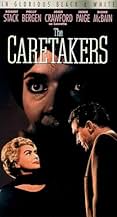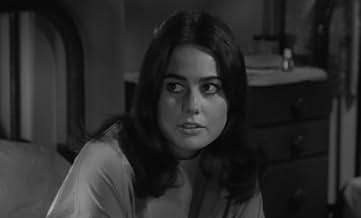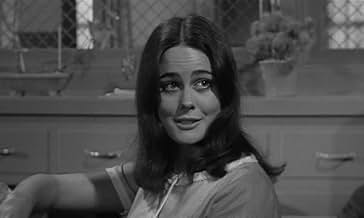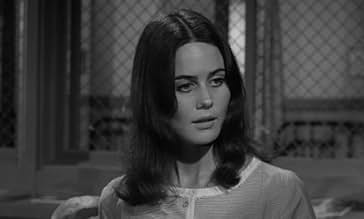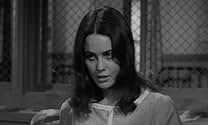Medical drama about mentally-ill patients and their professional caregivers, as well as the new group-therapy sessions aiming to replace the traditional physical restraint and electroshock t... Read allMedical drama about mentally-ill patients and their professional caregivers, as well as the new group-therapy sessions aiming to replace the traditional physical restraint and electroshock treatments.Medical drama about mentally-ill patients and their professional caregivers, as well as the new group-therapy sessions aiming to replace the traditional physical restraint and electroshock treatments.
- Nominated for 1 Oscar
- 5 nominations total
Ana María Lynch
- Ana
- (as Ana St. Clair)
Pamela Austin
- Student Nurse
- (uncredited)
Brian Corcoran
- Tony
- (uncredited)
George DeNormand
- Doctor
- (uncredited)
Featured reviews
There are only three reasons to see this film. One is to check out yummy, adorable Williams (later to portray "The Green Hornet" on TV) as a psychologist anybody would happily go nuts for. Another is tough, butch, always watchable Ford as a rigid, henchwoman-nurse from hell. Finally, everyone stand back....the queen of the cinema is comin' through!! Joan Crawford! With a unique and flattering hair color and a couple of dandy dresses, Joanie makes the most out of a smallish role as a nurse administrator bent on keeping her hospital stuck in the past, refusing to adapt to the new-fangled ways of Stack. Crawford, though she certainly had some major career highlights, was also seemingly always having to hang on and carve out a career in an ever-changing, ever-threatening Hollywood. That's why this role suits her so well. She and Ford make a wondrous tag-team of brittle, severe, old-guard battle-axes who do everything they can think of to prevent Stack from introducing his modern methods of psychiatric treatment. And who can forget her famed judo class in which she struts around in a figure flattering leotard (with a chiffon sweat scarf!) and tosses adversaries to the ground?! With the ludicrous, artsy, stagey band of group therapy patients who make up Stack's first experiment, how can one help but root for the shackle and straight-jacket team of Crawford and Ford?? Bergen opens the film with a truly embarrassing and overwrought scene at a movie theater. One has to wonder if it was this film which gave her that trademark raspy voice since she screams continuously (and has a penchant for tearing off her own dresses, but that's for Stack to figure out!) Paige is way, w-a-y out there in her "shocking" portrayal of a very loose nutcase, as well. There's even some unheard of actress (who was borrowed from someplace) who has an unhealthy attachment to a bird. This lady's scenes seem to be cut in from another movie altogether as the lighting and cinematography of all of her scenes barely match the rest of the film! Only the all-star cast (which also includes Vaughn, Oliver, Barrie and the shamefully underutilized McBain) makes this thing watchable. This is the basic look (hair style and color), for those that care, that Joan was sporting when she strode onto the stage at the Oscars to collect Anne Bancroft's award (as a snub to Bette Davis who had gotten a nomination for "Baby Jane".) She said she felt it made her look old, but it actually suited her well and was better than the dyed red she went with later on. Keep an eye out for the Pepsi wagon at the hospital picnic. Crawford was quite a pioneer in the product placement racket. Though her brightly-lit close-ups are legendary in this movie, Crawford actually was noted for letting the rather ill Marshall, a pal from the old days of Hollywood, get his work done first so he could be done for the day, thus causing her to be shot later in the afternoon, rather than in the more preferable early hours.
I don't know why I like this movie so much. I am sure that it has a lot to do with the fact that I love Joan Crawford, especially during the second half of her career. This particular film, in which she plays a severe and unyielding head nurse at a state psychiatric hospital, seems to have crystallized her persona of later years, much as "Mildred Pierce" did the same for the persona of the younger Crawford.
I have little to add to what other reviewers have said about "The Caretakers", except that it is not for everyone. The acting is over the top. The writing is awful. The treatment of the theme is very hypocritical in the sense that the film seems to mean well on the surface, but as it goes on, one feels that someone--the director, producer, et. al.--did their best to cram in as many gratuitous, sensationalistic moments as possible. This, naturally, defeats the film's original purpose, which was apparently to showcase more progressive methods for treating mental illness than were generally used at the time.
So why do I keep coming back to this picture at least once a year? Well, as I've said, it's mainly for Joan Crawford, but it's also for the film's camp value. EVERYONE here contributes to that, whether they knew it at the time or not. Polly Bergen chews her way through every scene with glorious relish, although she does become more subdued later on. Janis Paige--what can I say? She did a great job of portraying a mouthy slut. And so on and so forth.
I have read at least one account which stated that the filming of "The Caretakers" was besieged by script re-writes, which may explain the less-than-stellar results. Nevertheless, there's never a dull moment here, and as far as I'm concerned, that's a good thing. Movies are, after all, meant to entertain more than anything else, so if you watch this, watch it for that reason. And for good old Joan.
I have little to add to what other reviewers have said about "The Caretakers", except that it is not for everyone. The acting is over the top. The writing is awful. The treatment of the theme is very hypocritical in the sense that the film seems to mean well on the surface, but as it goes on, one feels that someone--the director, producer, et. al.--did their best to cram in as many gratuitous, sensationalistic moments as possible. This, naturally, defeats the film's original purpose, which was apparently to showcase more progressive methods for treating mental illness than were generally used at the time.
So why do I keep coming back to this picture at least once a year? Well, as I've said, it's mainly for Joan Crawford, but it's also for the film's camp value. EVERYONE here contributes to that, whether they knew it at the time or not. Polly Bergen chews her way through every scene with glorious relish, although she does become more subdued later on. Janis Paige--what can I say? She did a great job of portraying a mouthy slut. And so on and so forth.
I have read at least one account which stated that the filming of "The Caretakers" was besieged by script re-writes, which may explain the less-than-stellar results. Nevertheless, there's never a dull moment here, and as far as I'm concerned, that's a good thing. Movies are, after all, meant to entertain more than anything else, so if you watch this, watch it for that reason. And for good old Joan.
I'm clearly not on the same page as most of the reviewers. First, it's classic Joan Crawford camp. Not only is Joan campy and hilarious as the "head nurse" but the cast of characters kept me enthralled. Look, I don't expect too much "realism" in films about mental illness in the 1960's so I'm not quite getting the disgust that's being expressed.
Marion was also a special treat and her energy shined.
If there is any historical relevance in it is the fact the social norms around the mentally ill were being reconstructed in the 1960's. Not that there was any real legitimacy in how it was portrayed, the fact that it was part of the movie as evidenced by the "borderlines". Even the term "borderlines" is made up, but the point about the conception of the mentally ill having capacity to heal was discussed. I guess 'borderline' was meant to express "only borderline insane".
Look, if you love a good camp film film with great outrageous female characters, this is a great film to watch. A special bonus for those that love Joan Crawford!
Marion was also a special treat and her energy shined.
If there is any historical relevance in it is the fact the social norms around the mentally ill were being reconstructed in the 1960's. Not that there was any real legitimacy in how it was portrayed, the fact that it was part of the movie as evidenced by the "borderlines". Even the term "borderlines" is made up, but the point about the conception of the mentally ill having capacity to heal was discussed. I guess 'borderline' was meant to express "only borderline insane".
Look, if you love a good camp film film with great outrageous female characters, this is a great film to watch. A special bonus for those that love Joan Crawford!
The Caretakers (1963)
It's hard to imagine actually going to the movie to see this movie as a kind of entertainment, because it is more an experience and an emotional plea than a good idea for a first date. There's no question it's powerful, sometimes disturbing, and acted and filmed with intensity. It is, in its own way, a great movie, if you measure it only in terms of being moved. It is also a questionable movie in how it portrays these women, all of whom are "borderline" cases, and none of whom are openly diagnosed for us. Still, some of the most radical behavior is stuff I've seen first hand, and so it isn't completely unreasonable.
The big theme is interesting to see in retrospect: this seems to be about the very first shifts from large hospital care of the mentally troubled to residential care. The key to this is the notion that the patients (they call them "consumers" now) can form small, interactive "families" that encourage emotional and psychological support. It's a kind of giant co-counselling, and I think it's been shown to work in the fifty years since.
There are several equally strong characters as the plot follows one and then another, from patient to nurse to doctor. Joan Crawford gives a steely, power-performance as the head nurse, though only now and then. Herbert Marshall briefly appears as an aging, wise figure in his second to last film. The rest of the cast is made of lesser known actresses who act out the different characters of this woman's ward with disarming conviction (or theatricality, if you don't buy into their illnesses). The lead doctor is played by Robert Stack who never strikes me as quite up to any acting task, but then he's just a figurehead of authority and progress. The movie is in the hands of the women.
Director Hall Bartlett doesn't have much of a career as director, but he's managed to get a terrific cinematographer, Lucian Ballard, to make it a visually brooding and beautiful experience. And the music is by one of the best, Elmer Bernstein. The copy of the movie that streams on netflix has a flaw in the sound which was unfortunate--the quiet portions, including some important conversations, were very quiet, and then when the music and screaming explodes in other scenes it'll hurt your ears. Very very loud. It made for a clumsy viewing, moving the volume up and down, backtracking now and then to see what we missed.
Expect to be impressed and moved and possibly slightly shocked. Overlook some of the neatened up psychology that is a product of both the era and the era the movie was made. And don't look for a surprising plot. Instead you'll get to know a few of the women and when it gets to the final scenes it'll be moving and even a little joyous. If you let it.
It's hard to imagine actually going to the movie to see this movie as a kind of entertainment, because it is more an experience and an emotional plea than a good idea for a first date. There's no question it's powerful, sometimes disturbing, and acted and filmed with intensity. It is, in its own way, a great movie, if you measure it only in terms of being moved. It is also a questionable movie in how it portrays these women, all of whom are "borderline" cases, and none of whom are openly diagnosed for us. Still, some of the most radical behavior is stuff I've seen first hand, and so it isn't completely unreasonable.
The big theme is interesting to see in retrospect: this seems to be about the very first shifts from large hospital care of the mentally troubled to residential care. The key to this is the notion that the patients (they call them "consumers" now) can form small, interactive "families" that encourage emotional and psychological support. It's a kind of giant co-counselling, and I think it's been shown to work in the fifty years since.
There are several equally strong characters as the plot follows one and then another, from patient to nurse to doctor. Joan Crawford gives a steely, power-performance as the head nurse, though only now and then. Herbert Marshall briefly appears as an aging, wise figure in his second to last film. The rest of the cast is made of lesser known actresses who act out the different characters of this woman's ward with disarming conviction (or theatricality, if you don't buy into their illnesses). The lead doctor is played by Robert Stack who never strikes me as quite up to any acting task, but then he's just a figurehead of authority and progress. The movie is in the hands of the women.
Director Hall Bartlett doesn't have much of a career as director, but he's managed to get a terrific cinematographer, Lucian Ballard, to make it a visually brooding and beautiful experience. And the music is by one of the best, Elmer Bernstein. The copy of the movie that streams on netflix has a flaw in the sound which was unfortunate--the quiet portions, including some important conversations, were very quiet, and then when the music and screaming explodes in other scenes it'll hurt your ears. Very very loud. It made for a clumsy viewing, moving the volume up and down, backtracking now and then to see what we missed.
Expect to be impressed and moved and possibly slightly shocked. Overlook some of the neatened up psychology that is a product of both the era and the era the movie was made. And don't look for a surprising plot. Instead you'll get to know a few of the women and when it gets to the final scenes it'll be moving and even a little joyous. If you let it.
One of the most common interest points for me in seeing any film is good concepts or when it takes on a subject not easy to tackle but always worth addressing. Something that was also covered in 'The Snake Pit' and 'One Flew Over the Cuckoo's Nest'. That was the case with 'The Caretakers'. Plus it had Joan Crawford (though the film was from her twilight years period) and Herbert Marshall in it, Crawford especially was more often than not worth watching despite her film choices being up and down.
'The Caretakers' is not one of her best films, nor does it contain one of her best performances. It is also not one of her worst on either count either. It struck me as a rather disappointing but still semi-watchable film that primarily suffers from how it deals with its subject. It may have had good intentions but it didn't translate in the execution, on this front 'The Caretakers' struck me as somewhat lacking in good taste which was somewhat frustrating.
It is benefitted by some very stylish and atmosphere-laden photography and the setting is suitaably austere. Elmer Bernstein's score has haunting moments.
Did not think much of the acting really, but some of the cast come off well. Polly Bergen may have had some terrible and rather limited dialogue, but she had a quite challenging role and manages to give the character force and nuance. Janis Page also does wonders with a role that sounds one-dimensional but makes it remarkably real.
Elsewhere, we have a stiff Robert Stack looking as if he wanted to be somewhere else, even for a sympathetic character he manages to make the character dull, and Crawford in a part that she should have been perfect for chewing the scenery to smithereens. Marshall also looks ill at ease in a part that has so little to it. None of the characters are written very well at all, too "black and white" so either characters too perfect or ones with not a redeeming bone in their bodies and never really in between (Page's being a possible exception). The direction is bland at best and schlocky at worst.
Although Bernstein's score has moments, too much is ridiculously overblown and over-emphasises the mood too much. The script goes well overboard on the camp, containing some real howlers, and is very awkward such as with poor Bergen in the early stages. The story is a real mess, what could have been a hard hitting and poignant film was instead rather gratuitously distasteful, offered very little insight into the subject, showed no respect for it or its characters and because of its numerous bouts of unintentional humour it was very difficult to take it seriously, something that the writing was not good in general at doing. Almost to an insulting degree.
Concluding, disappointing. 4/10
'The Caretakers' is not one of her best films, nor does it contain one of her best performances. It is also not one of her worst on either count either. It struck me as a rather disappointing but still semi-watchable film that primarily suffers from how it deals with its subject. It may have had good intentions but it didn't translate in the execution, on this front 'The Caretakers' struck me as somewhat lacking in good taste which was somewhat frustrating.
It is benefitted by some very stylish and atmosphere-laden photography and the setting is suitaably austere. Elmer Bernstein's score has haunting moments.
Did not think much of the acting really, but some of the cast come off well. Polly Bergen may have had some terrible and rather limited dialogue, but she had a quite challenging role and manages to give the character force and nuance. Janis Page also does wonders with a role that sounds one-dimensional but makes it remarkably real.
Elsewhere, we have a stiff Robert Stack looking as if he wanted to be somewhere else, even for a sympathetic character he manages to make the character dull, and Crawford in a part that she should have been perfect for chewing the scenery to smithereens. Marshall also looks ill at ease in a part that has so little to it. None of the characters are written very well at all, too "black and white" so either characters too perfect or ones with not a redeeming bone in their bodies and never really in between (Page's being a possible exception). The direction is bland at best and schlocky at worst.
Although Bernstein's score has moments, too much is ridiculously overblown and over-emphasises the mood too much. The script goes well overboard on the camp, containing some real howlers, and is very awkward such as with poor Bergen in the early stages. The story is a real mess, what could have been a hard hitting and poignant film was instead rather gratuitously distasteful, offered very little insight into the subject, showed no respect for it or its characters and because of its numerous bouts of unintentional humour it was very difficult to take it seriously, something that the writing was not good in general at doing. Almost to an insulting degree.
Concluding, disappointing. 4/10
Did you know
- TriviaJoan Crawford went out of her way to help an aging Herbert Marshall with his lines. She also arranged to have his scenes filmed first so he could leave the set early in the day as he was an old friend and in ill health.
- GoofsAs Lorna runs into the hospital, there's nothing outside the door. But the shot from inside shows a small wall just outside the door which she would have had to jump over or go around to enter.
- ConnectionsFeatured in Hollywood: The Great Stars (1963)
Details
Box office
- Gross US & Canada
- $2,050,000
- Gross worldwide
- $3,160,000
- Runtime1 hour 37 minutes
- Color
- Aspect ratio
- 1.66 : 1
Contribute to this page
Suggest an edit or add missing content


